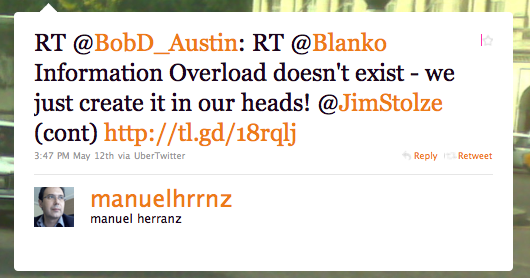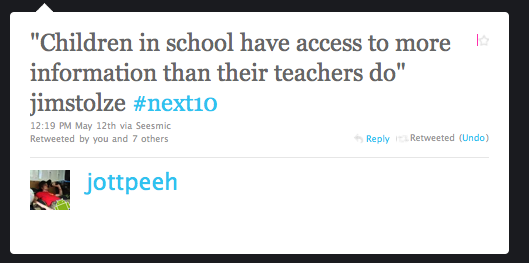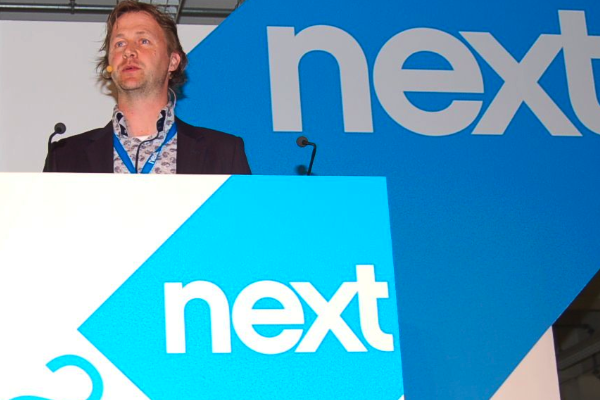Last week I was in Berlin attending and speaking at the NEXT-Conference 2010. Other speakers included Stowe Boyd, Andrew Keen and Cindy Callop. I was in the track “openess” together with Steve Rubel.
Some of you may have watched the live-stream but I got some questions about the slides, so I put them up on Slideshare and wrote down a version of the transcript: .
It’s an honour to be here on behalf of the Virtual Happiness Institute. I have a short presentation. Gonna give you some updates on our research and then tell you how we can prevent the next epidemic. But first, I may not be the next Uri Geller, but I know what’s on your mind right now: “Why would we need an institute for Virtual Happiness? ”
And the answer is so obvious! Just like the government of Bhutan uses Gross National Happiness (instead of GPD) to measure the success of its policies, we –as an Internet community –should focus on our digital well-being more than ever! The Virtual Happiness Institute keeps track of this research in Internet psychology. Basically what we do is to write about anything that a blogger finds too boring and study everything that a scientist finds too much fun.
It’s all based on a simple research question: does the internet make us happy?
We asked people how they would rate their own happiness . And it turns out Western Europeans are moderately happy. They rate it a 7,11 on a 10 scale. In the American system this would have been a B right? But how would this live satisfaction change when they had to live without the Internet for a full month? And then you see their happiness drop straight to a 6.3.
After we published these results we got some complaints. People said: “Well this sounds nice, but there something wrong with your method. You can’t live without the internet, so that’s not an option.” So we designed a new experiment. We found someone (me) who was quite an internet fanatic (yep, that’s me) and we persuaded him to go unplugged for more than a month. Mind you. Until then this hadn’t been not done before. The experiment has had a lot of following , but until then this was the first time.
So, I went completely offline for a whole month. Nearly 40 days without the Internet, no Google, no Email, no surfing, no twitter, Nothing. The most fun thing I ever did, at least in the first week. During this period I kept a diary. (you all know what that is right? Sort of an offline weblog) And this was eventualy published as a book in Dutch with the title “how to survive your inbox”. Because my conclusion at that time was that living without the internet was awful, but living without email was fantastic.

After this experiment studies came out that underlined this principle. A survey conducted in 2008 took 18.000 respondents from 25 European countries and questioned their lives on aspects like income, health, education and so on. The results showed that “people … connected to the Internet are considerably more satisfied with their lives.” Many surveys and studies later. We believe that we have found the answer to the question “does the internet make us happy”. There is proof that it’s indeed social interaction that drives your virtual happiness: the ability to connect to friends, family and of course attractive stranger .
And what interferes with your happiness is our in-ability to comprehend digital information. There is no information overload, that simply doesn’t exist. That is a problem of our generation. We treat digital information as if it were physical objects. We you entered the job market, mail was physical. It came in once or twice a day and it landed on your desk. When the pile got too high, you simply got an assistant. But nowadays, there’s no way you can see if your mailbox is too full. And there is no way that you will get an assistant. Digital information shouldn’t take in place, neither on your head, neither on your desk. It’s in the cloud, leave it there.
The consequences of this thinking can have great impact. (Not everyone seems to understand this: A study found that 95 percent of those questioned check their business e-mail outside of work, 78 percent while in the bathroom and 11 percent during “intimate moments.” This by the way gives a whole new meaning to hotmail don’t you think?)

We’re now in the unique situation that children in classrooms today have access to more information then their teachers do. Yet, these teachers are educating them the way we were taught to use the phonebook. It’s physical thinking, which means it’s linear and it’s based on an hierarchy of authority. Where it should be digital thinking, wich makes it asyncronous and based on a network of reputation. I’m saying that we should treat digital media literacy with the same urgency as we do obesity.
Internet access is now a birth right – that’s a given. But so is a Big Mac and Coca-cola. If we want to stop our children from becoming ‘infobese,’ then we need to educate and guide them in their online habits.
That’s why I’m calling upon on you. You are gamechangers. I urge you to have a conversation with you local school about the way they teach media literacy. And help them.Don’t let infobesity be the next epidemic, our future Internet happiness depends on you.

